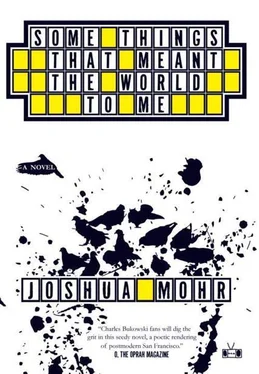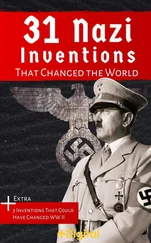There were voices, working their way toward us, orange vested voices no doubt, beginning to pinpoint the epicenter of all that was going wrong.
I looked at Letch and said it one last time, "I think you're a bastard."
"You can do better than that by now. Put your balls into it."
He'd taught me how to put my balls into things, and there was one last sequence of events that needed them: like striking a match and holding it to the amnesty bench's plastic red and yellow awning until it started to drip down on him. I put my balls into realizing that the only thing I had to burn today was him. Letch's face contorted into anger and he said, "What are you doing?" and I said, "I can finally do it," and he said, "Do what?" but I didn't answer, letting the awning melt, turning to hot wax, torture raining down on Letch, dousing him in color. He yelled and bellowed and shook his head around, trying to keep the freefalling colors out of his mouth, but the wax got so hot that it boiled on his skin. Violent, hysterical bubbles. Letch screamed, tried to get off the bench, but the wax, like glue, had fastened him to it and he couldn't move. He flailed his arms. I could see less and less of Letch as the colors smeared all over him.
I said, "Of course you love your own son," and Letch said, "You're not my son," which was true, but it didn't matter anymore. It didn't matter whose son I really was, because family could mean so many different things. It could mean anything. Maybe my mom was my mom, but maybe old lady Rhonda was my mom, or maybe there were no moms and there were no dads and there were no children, only people. Maybe that's enough.
The burning wax slathered all over Letch's face, dissolving his lips and eyes and nose, melting them to nothing, coating him in a red and yellow mask. I said, "Tell me where she is," and I could hear him trying to say things, but they were only mumbles mashed into the mask. I looked at him one last time: a statue, frozen, castrated. He was fixed to the amnesty bench, and I wondered, did that mean he'd tell the truth forever?
The last thing I did was fuzz his head, which didn't have hair anymore, but felt smooth like a rubber ball, very hot, swirled in color.
I slipped out into the aisle, acted like a panicked customer, too, except I wasn't running away, wasn't fiending for an exit, I was running up and down different aisles, looking for her. If he was here, she was here. I tried to blend in with the mania, the roiling fear of everyone else. I saw their faces and made mine look petrified, slaloming down random aisles, camouflaging myself as another person trying to make it out alive.
I turned down another one. There were four displaykitchens set up. Sinks, countertops, cupboards. Refrigerators. Microwaves. Pots and pans hanging off racks. Expensive light fixtures dangling over the stoves.
I ran by the first three of them, jumping over huge cracks in the floor and massive piles of sand, sidewinders winding all around me, purring. And as I sprinted past the last kitchen, I saw my mom standing there, and she said, "Are you hungry?" reaching into the freezer, pulling out some taquitos. She smiled. "I can thaw these if you're hungry."
I stopped, walked over to her. "Where have you been?"
"I don't know, babe"
"Tell me."
Sidewinders slithered all around us.
Another cluster of panicked customers ran by, as we stood in the kitchen.
"I don't know what to tell you," she said, shaking a few taquitos onto a plate, placing them in the microwave.
The fire alarm wailed.
A man's voice came over a loud speaker, "Please go directly to an exit and leave the store in a calm and orderly manner."
She started to slowly sink in the sand underneath her. But she didn't even notice. The world, her life, her everything was changing all around and she wasn't even noticing. There were a thousand things I wanted her to tell me, a thousand things I had to ask, a thousand explanations I needed to get so I could save my fraying sense.
"We don't have much time," I said. "Tell me."
She fiddled with the buttons on the microwave, inching lower. "How long do I cook these for again? I can't remember, baby"
"Mom, answer me."
"I think it's a minute and a half." She pushed more buttons on the microwave. Inching. Inching. "But I can't say for sure."
"Mom!"
Inching.
"You don't remember, baby?" She'd sunk far enough that the microwave was out of her reach. "I'm sorry," she said. Her body getting lower and lower. Buried fast. Up to her waist. I grabbed her hands and tried to keep her from leaving, but I couldn't do anything to stop her. "I can't reach. You'll have to finish yourself."
Me, Rhonda, I couldn't do anything to make her stay.
Up to her chest.
"You can finish them yourself, I know you can," she said.
The man's voice came over the loud speaker, "Please leave the store immediately. This is an emergency situation"
"Don't go," I said to her. "Please don't."
She sank farther into the sand.
Up to her neck now.
She looked up at me. Just a face. A sinking sad face. A sinking sad face I'd never see again. "I'm sorry I couldn't stay with you," she said.
"Why couldn't you?"
"I'm sorry."
"Why?"
"I'm so sorry."
I heard a voice behind me, an orange-vested employee saying, "Hey, man, come on. We have to get you out of here."
"I'll be there in a minute."
"Now"
"Just a second."
He came over and grabbed me by the shoulders.
"Let go!" I said.
"You have to get out of here."
With only one good hand, there was nothing I could do, no way to fight him off. He dragged me away. I called to her, "Why didn't you try and find me after I got out?" but she didn't answer, her face vanishing in the sand, her hair lying on top of it like a dead animal.
Then the last strands of her, the idea of her, were swallowed up.
"What's wrong with you?" the orange-vested employee said. "You have to get out of here!" and he dragged me, away from her, away from Letch, dragged me through the exit and left me on the sidewalk with all the other scared people.

We were all together. Me, my mom, and Letch. She'd thawed another dinner, this time chicken burritos. She put the burritos on plates. Nothing else was on the plates, just those dry white rectangles. Letch frowned at it, looked at me, pretended to throw up. I laughed. She asked what the hell was so funny, you guys, but she knew we were joking about her crappy cooking and sometimes she'd joke about it, too.
Pretty soon we were all pointing at our burritos and laughing.
Letch said, "Doesn't this look scrumptious, Rhonda?"
I said, "Fit for a king."
She said, "This recipe has been passed down in my family for centuries."
I took a bite. Letch took a bite. She took a bite.
Letch, still chewing, said, "It's even more delicious than it appears.
I said, "This is the best thing I've ever tasted."
She said, "The trick is to microwave them for sixty seconds. A lot of people don't know that."
We were all laughing, but kept shoveling more burrito into our mouths.
Letch said, "Do you have some moral objection to salsa?"
I said, "It is a little dry."
My mom said, "Salsa?" and shrugged her shoulders. "I say the drier, the better."
We were still laughing.
"I hear what you're saying," Letch said to her, "but if I really, really wanted salsa, do you think it would ruin the dish?"
I said, "If the drier, the better, should I go outside and get some sand to throw on top?"
Letch leaned over and fuzzed my head.
Читать дальше












